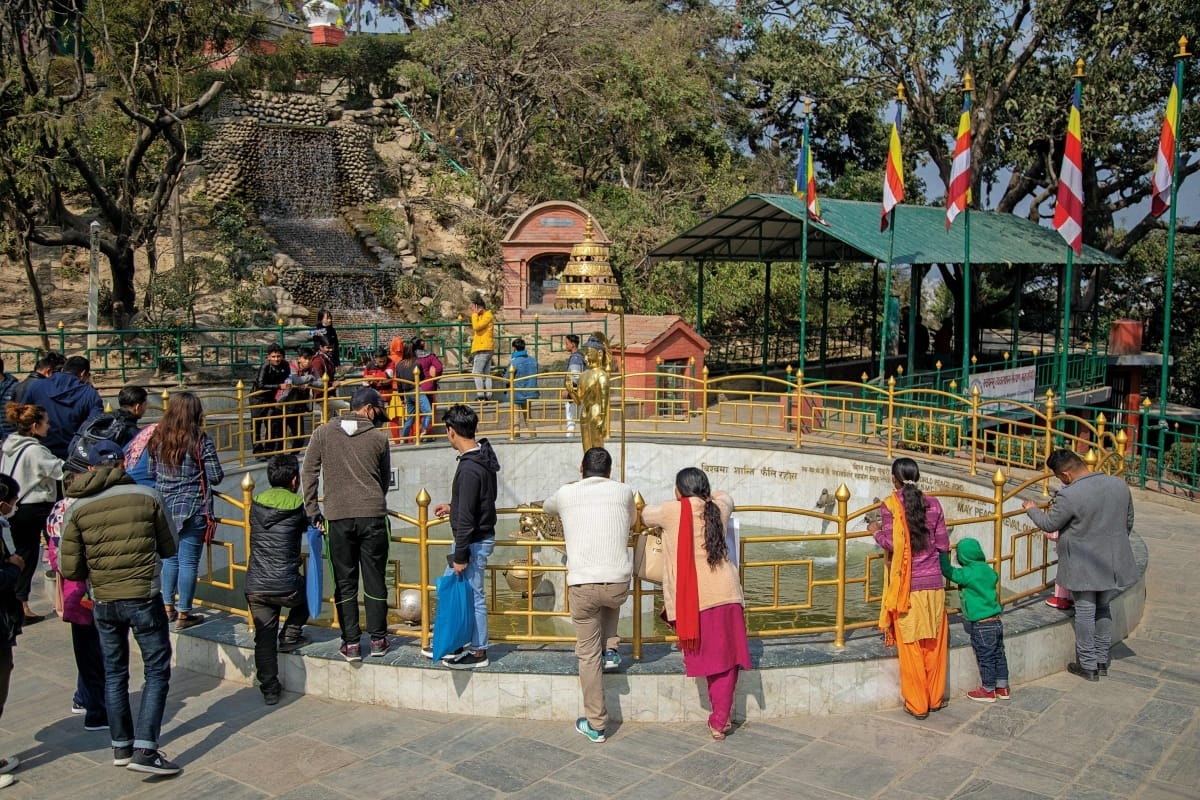“It will not be expected that I should be able to describe, or even to enumerate, all the towns and villages of this valley…. I shall content myself, therefore, with a slight review of the most remarkable among them,” observed Colonel Kirkpatrick in “An Account of the Kingdom of Nepal”. The book was based on the Englishman Kirkpatrick’s observations made during a mission to Nepal in the year 1793.
 There are many small Newar towns and villages around Kathmandu, Patan and Bhaktapur, which have their own cultural and religious importance. Writing about all aspects of the history of these towns is as difficult today it was during the period of Kirkpatrick. These villages are the lifelines of the main cities that constitute Kathmandu valley in celebrating festivals and rituals. Some peripheral towns have a longer history than the main cities. Khokana, a traditional Newar town eight kilometers south of Kathmandu (on the outskirts of Patan), also has its own illustrious past.
There are many small Newar towns and villages around Kathmandu, Patan and Bhaktapur, which have their own cultural and religious importance. Writing about all aspects of the history of these towns is as difficult today it was during the period of Kirkpatrick. These villages are the lifelines of the main cities that constitute Kathmandu valley in celebrating festivals and rituals. Some peripheral towns have a longer history than the main cities. Khokana, a traditional Newar town eight kilometers south of Kathmandu (on the outskirts of Patan), also has its own illustrious past.
Many small towns are vanishing in the wave of modernity. Others are gradually losing their special identity. In the quest for survival, some families have shown the determination to retain their traditions. Purna Bahadur Dangol, aged 59, and his family in Khokana is one of them.
Two decades ago, visitors and residents in the Patan town regularly encountered people carrying mustard oil to sell in the main cities. The situation has changed today, with the easy availability of other types of oil. The population of Patan and Kathmandu, who relied on Khokana’s mustard oil, now have enormous choices and alternatives from different parts of the country and the world.
As the popularity of Khokana’s oil gradually diminishes, more and more people of the town are leaving their traditional profession for more profitable pursuits. The family of Purna Bahadur Dangol however, is happy running the traditional business. His son and grandson, too, are supporting him. Dangol has registered Rudrayani Oil Mill and is running it at Bhainsepati, a few kilometers away from his traditional hometown.
One can pick up the aroma of mustard oil cooking hundreds of feet away from his mill. “Our oil is better than any sunflower or soybean oil, as we produce it by following centuries-old practices and techniques,” said Dangol, whose oil mill consists of modern as well as traditional technology. “The combination of modern and traditional methods helps us to maintain the flavor and quality.”
Traditionally, producing, drying and threshing mustard is manual work. The pressing work is done using wooden instruments, but modern equipment has made things easier.
Dangol’s 24-year-old son, Buddhidhar, supports his father’s traditional business. “I want to continue my family profession, since I have learnt all of the methods and techniques of producing oil,” said Dangol, a third-year student working towards a Bachelors in Business Science.
In Khokana, producing mustard oil was based on a community system, as the community owned the oil mill. But many people have started family units. “Unlike our other relatives and neighbors, my sons have shown an interest in continuing this business. I am proud that this will help to preserve this centuries-old tradition,” said Dangol. He has employed half a dozen people in his mill, where people come from faraway places to buy mustard oil.
There is no history that tells us when Khokana began to produce mustard oil, but the village is very popular for the item. Part of the reason is the cultural and religious significance of mustard. Mustard oil dregs are used by people for washing their heads and bodies, in order to purify them. “From birth to death and other religious rituals, we have to use mustard oil dregs to purify and qualify for the functions,” said Mohan Shyam Khokana, a prominent cartoonist in the local media.
Kirkpatrick indicated the presence of many Newar villages and towns around the main cities in the eighteenth century. Although no historians have traced the records of Khokana, this town does have its own unique character. “There are many old and traditional Newar towns outside the three main cities and they have their own religious, cultural and historical importance,” said Saphalya Amatya, renowned archeologist. And of course, “Khokana has also its own significance in producing mustard oil.”
Every 12 years, Khokana’s people watch the chariot of Red Machindranath going to the main city of Patan, but this ancient city is losing its own significance. With the introduction of packed mustard oil produced from bigger factories, the small cottage industries with traditional techniques cannot compete in the local market. In the last decade, many traditional oil mills have either closed down or have been dismantled.
“Small industries cannot survive in this competitive consumerism society without modification and cost saving,” says junior Dangol. “We use machines for husking mustard and press (the hot mustard seeds) with two wooden frames to produce the oil. We still retain these traditional machines, but modern equipment is used in many places.”
Other towns in the valley also produce mustard oil, but from these none matches the oil of Khokana. Many people attribute this to the diligence of its people. “As far as I know, all my ancestors were involved in the mustard oil business. As the old machine is no more profitable; I switched to the modern electric one. More than a dozen people used to be required to work the traditional equipment,” said Dangol.
“Earlier, we usually collected the mustard from the surrounding areas but now we have to rely on mustard imported from Chitwan, Nawalparasi and Dang. Our method is different since we dry the mustard before putting it in the pressing machines so people can taste the natural flavor.” With the trend of bigger oil mills, the traditional method of pressing mustard is gradually vanishing.
Badly damaged by the great earthquake of 1934, Khokana is not as appealing as Bungamati, the nearby village so much in the news these days due to the festival there. However, it has retained the traditional aspects of Newari life and some of its own unique traditions. Many of these villages surrounding the three main cities have their own peculiarity in terms of place and position. Some are known for straw mats, others are known for beaten rice, another for bamboo buckets, and so on.
Every Newar town situated in the outskirts of the valley has its own story to tell. The younger generation of Dangol’s family has shown a keen interest in keeping the tradition of producing mustard oil alive. Whether they will succeed in maintaining the fame of Khokana’s oil remains to be seen.
Reinhold Messner
“Traditional mountaineering is the art of not dying.” Reinhold Messner is one of the most well known...










